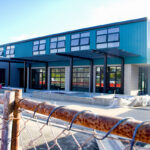CARLSBAD — A recent ruling from a three-judge panel of the 9th Circuit Court of Appeals has thrown the city’s plans to require the electrification of new buildings into question.
In a lawsuit brought by the California Restaurant Association, the federal appeals court ruled against the City of Berkeley’s ordinance banning natural gas pipelines in new buildings on the basis the law preempts the federal Energy Policy and Conservation Act.
In 2021, the Encinitas City Council passed a similar ordinance strongly limiting the use of fossil fuels in new developments, essentially banning natural gas from future homes and buildings and replacing it with electric-only water heaters, cooking ranges and other appliances.
However, the Carlsbad City Council decided to move forward with developing its own “reach code” to push toward electrifying all new construction during its May 9 meeting.
Last year, the University of San Diego’s Energy Policy Initiatives Center provided the city with three options for electrifying new buildings:
1. Electric only, or building no new gas infrastructure
2. Electric only to building code, or requiring that all new construction is electric only
3. Electric only plus energy efficiency or photovoltaics, or requiring that all new construction is electric only and exceeds energy-efficiency standards.
The council, scheduled to hear the item again on July 11, will wait until an appeal is filed and accepted to explore alternatives, such as setting higher building efficiency standards without requiring new construction to be all-electric.
“There is one option, and it’s the reach code that does not define all-electric, but prefers it,” said Joe Kaatz, an Energy Policy Initiatives Center attorney and consultant. “Until we have certainty of what will happen, that is the option. If this opinion gets overturned by an en banc panel, then we’re back to the races with all-electric.”
According to Katie Hentrich, the city’s senior program manager, the reach code could take between six to 12 months to develop, plus another two to six months for the California Energy Commission to approve it. The code would be effective once it is filed with the Building Standards Commission.
The report said only two cities in the state have such a code, although they can be used to regulate mixed-fuel buildings that are exceptions to all-electric definitions.
Hentrich and Ron Kemp, senior assistant city attorney, said the reach code sets efficiency standards and avoids definitions rather than banning natural gas outright.
“If Berkeley has good legal arguments, this may still be possible,” said Councilwoman Teresa Acosta. “More than 70 cities are doing this.”
While the all-electric approach would have the greatest reductions to greenhouse gas emissions, it would also have higher costs for multi-family construction, which typically require more appliances and hook-ups, Hentrich said. Single-family units would have lower costs.
Hentrich also acknowledged it remains unclear if the addition of all-electric appliances, such as water heaters, stoves, washers and dryers, would place an additional strain on the electrical grid. Several residents spoke to last year’s heat wave and the restrictions on charging electric vehicles and other devices as proof electrification would only further burden an already stressed grid.
Acosta pressed the city to act fast to tackle climate change as fast as possible. However, Kemp and others said Berkeley has until May 31 to challenge the ruling, which several Berkeley City Council members have pledged to do.
But there is no guarantee the court will take up the case again. If it does, the appeal would go to a larger panel, taking up to a year or more before a decision is rendered, leaving more than 70 cities in the state in limbo on enacting similar ordinances.
“There is a lot of uncertainty right now,” Kemp said. “Their (restaurant association) argument says federal law says you can have (gas appliances), so when Berkeley banned those, they were effectively banning those appliances.”
Acosta and Councilwoman Priya Bhat-Patel also discussed other actions for the council, such as banning gas-powered leaf blowers and lawnmowers, along with prohibiting parents from idling in their vehicles before and after school. Councilwoman Melanie Burkholder supported the idling ban but said it would be difficult to enforce.




